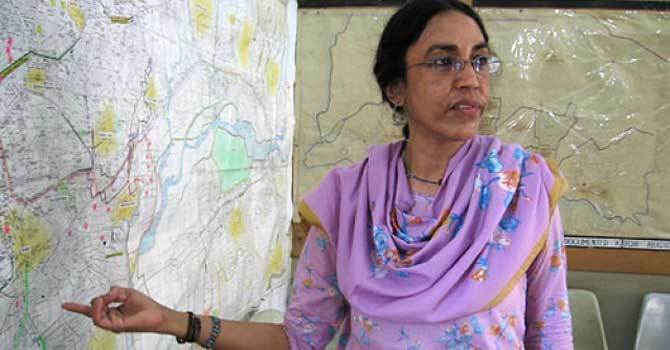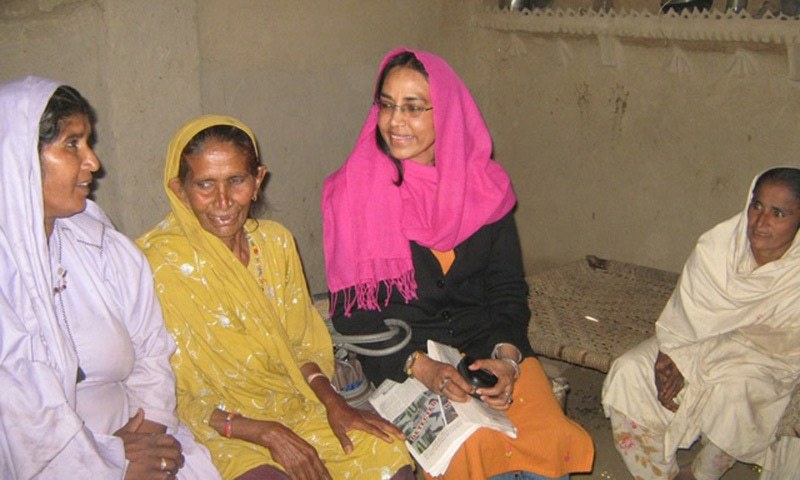The life of the urban poor in Pakistan is miserable on many counts. The absence of dependable livelihoods, traumatic experiences of social dislocation (that many have to pass through), complete reliance on informal approaches to shelter and services are some traits.
A greater challenge is the perception that the rich and affluent carry about the poor and their settlements. Some believe that katchi abadis (squatter settlements) house criminals and outlaws. Others consider such places only worthy of evictions and bulldozing for being “illegal”.
It is a small group of public-spirited citizens, professionals and social scientists who apply themselves to learn challenges faced by such people and devise tangible solutions.
Perween Rahman’s name is among the foremost in this list. In her entire professional career and work, she worked tirelessly to campaign for the rights of the underprivileged and conducted solid and evidence-based studies that unearthed the dark realities, causing social and economic injustices to the deprived millions around.
Her scientific approach to cause development through cooperative action and research under the banner of the Orangi Pilot Project and other such institutions became a replicable example. Such deprived communities continue to benefit from these invaluable experiences even after her tragic assassination in March 2013.
It will be useful to understand the core philosophy that Perween and her colleagues at OPP subscribed to. They considered the underprivileged people a worthy part of the society who did not need doles or charity.
Such people, in the absence of state assistance, attempted to change their lives and destiny through self-help. In this stride, these communities needed assistance in the form of professional and managerial guidance.
They needed support in respect to health care, sanitation, upscaling of enterprises, education, building homes and other facilities. In other words, this large population all across Karachi and many other cities and locations in the developing world desired inputs from doctors, engineers, educationists, business professionals and architects to develop solutions for application to help change their lives.
OPP, under the leadership of Perween, had embarked upon a path that aimed to evolve catalytical actions for communities by working closely with them.
This appreciation of the plight of the poor had been induced in her due to a sharp observational capacity; ability to interact and relate with the hard-up people as well as the intention to catalyse change through cooperative action.
She taught the students of architecture with the same approach with an objective to sensitise them to the forces that shaped the built environment and options where the poor can be professionally helped.
Despite her very busy schedules, she always extended teaching support to schools of architecture as she firmly believed that more young people will be able to understand the dynamics of development in various contexts.
Instilling consciousness
Discussion on Perween’s life will be incomplete without covering her teaching and educational efforts.
Her favourite courses were studies in environment and urban planning. Through an informed discussion format, Perween used to lay down key knowledge points around the core topics of the curriculum.
She would outline the important facts and observations with her succinct analytical review of the same before her students. Then they were asked to add new facts and observations to expand the knowledge base around the subject matter of discussion.
Thus rather dry topics such as environmental profile of South Asian regions, development and environment interface in Pakistan, critical review of major human interventions in the natural environment, reasons of variation in typologies of buildings and assessment of diversities in human habitat were deliberated with profound enthusiasm. Perween brought such energy and liveliness to the class that even the dull and distracted would find some interesting attribute to be part of the group work.
Perween, in her usual unassuming manner and soft voice, would delve into some of the most complicated trajectories of intellectual discourse with effortless ease.
Most of the students used to look forward to her class as it provided the opportunity to freely express and interact with the teacher without any fear of reprimand and rejection. Her simple but bold methodology made many shy and laid back students gather courage and strength to speak up their minds.
Educational experts are usually of the view that rote learning and textbook-based pedagogy alone cannot sharpen young professionals to address complex challenges in the real world.
Perween taught with an objective to make her students observe the ground realities of the topics under discussion. Many such topics were covered by undertaking field observations, surveys and interviews with the concerned.
When she was teaching her students the process of evolution of katchi abadis, she took them to the terrains of Orangi and Qasba to make them observe first-hand the dilapidated and inhuman conditions in which people lived. It was a tough yet life-changing exposure for many architects under training who became motivated to adopt careers for the benefit of the poor and the society at large.
Uncovering the truth
Perween also emphasised the importance of exploring the real truth behind obvious situations.
Through interviews and other research methods, she taught her students the sequence and process that could lead to the unearthing of reality that was usually hidden under smudgy layers of fiction!
If young people with little or no resources remain unemployed, they can become a huge social liability. Community youth from various underprivileged areas were invited by Perween to learn skills of various kinds for earning a living.
She emphasised map-making as a distinct method for projecting analysis and presenting realities.
Information gathering around the topic of consideration, basics of drawing, reading and interpreting visual symbols and details, understanding the symbols representing various phenomena and then preparing a commensurate map accommodating the details was a usual combination.
It may be noted that these young people often had little background in formal education. But during their stints of learning at youth training programmes, they not only gained competence as technical expertise but also social entrepreneurship to support themselves.
A sizable number of such youth is now gainfully employed in Orangi and elsewhere in Karachi. Many of them were able to set up social enterprises of various kinds.
Such skilled youth have been instrumental in assisting flood affectees in re-building their houses and rehabilitating their enterprises, mapping the unabated land grabbing along the peri-urban village locations in Karachi and extending input to infrastructure development works in underdeveloped neighbourhoods in various cities.
Asian Coalition for Housing Rights, a large group of development organisations and individuals in this continent, sent many young people from various countries to learn such methodologies from Perween and her comrades.
On several occasions, Perween also visited and conducted short training in various parts of the world. A sizable number of beneficiaries of such inputs have been all praise for the worthwhile training input and exposure received at her hands. While these professionals did not attain any recognized or high sounding degree, they were called paraprofessionals, a term coined by OPP to give recognition to this useful cadre of groomed workers.
The best tribute that one can pay to Perween is by consolidating the path of training and education of young people around issues of deprived communities.
Perween proved by way of her work and eventually martyrdom that an alternative path to professional work can lead to a social change, not short of a silent revolution! And Perween’s legacy will live in the form of this invaluable heritage of capable young people, who shall surely manifest a change in this troubled society.
Published In Dawn By Noman Ahmed




